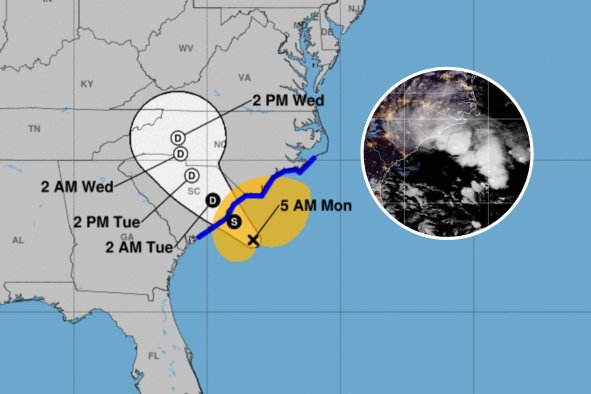Postmenopausal women might be more at risk of type 2 diabetes, according to research published by nutrition science company ZOE.
Type 2 diabetes is a chronic disease whereby the body struggles to process sugar in the blood, and fluctuating blood sugar levels is a risk factor.
Recent research by ZOE indicated that women post-menopause may experience greater spikes in blood sugar than other groups, especially after mealtimes later in the day.
More From Newsweek Vault: Compare the Top Health Savings Account (HSA) Providers
"We know that time-of-day can affect the size of your blood sugar response in any individual," Professor Sarah Berry, chief scientist at ZOE, told Newsweek. "But in our recently published research, we found that sex and menopausal status can influence this diurnal [time-of-day] variation.
"We found that women have a larger diurnal variation than men (i.e. there's a greater difference between breakfast and lunch blood sugar responses) and in postmenopausal women (compared with premenopausal) this diurnal variation is even greater.
"Knowing this information is important because these variations in blood sugar responses can really affect how you're feeling throughout the day in terms of your energy levels."
When we eat food, sugar is absorbed by the body and released into the bloodstream: blood sugar, or blood glucose. The hormone insulin is then released to remove this glucose from the blood and take it elsewhere in the body to be used as energy.
More From Newsweek Vault: Online Banks vs. Traditional Banks: Learn the Differences
Some people struggle to process dietary sugars more easily than others, and so may experience dramatic fluctuations in their blood sugar levels throughout a day, which can lead to diseases such as type 2 diabetes.
The Centers for Disease Control and Prevention estimate that 11.6 percent of the U.S. population has diabetes, and 38 percent of U.S. adults have prediabetes, experiencing fluctuating blood sugar levels that could lead to type 2 diabetes.
More From Newsweek Vault: What Is a Health Savings Account?
"It's important to remember that fluctuations in blood glucose levels throughout the day are completely normal," said Berry. "For example, after eating a meal containing carbohydrates, your blood glucose levels will naturally rise as your body absorbs glucose into your bloodstream.
"The levels will then fall again, as your body releases insulin and takes up glucose into your cells.
"At ZOE, we don't encourage anyone to try and flatline their blood glucose response— this is not the aim. However, research shows that blood glucose peaks which are excessive and repeated over a prolonged period of time can increase inflammation, and increase our risk of some chronic diseases."
Berry said that ZOE's research also indicated that people who experienced more blood glucose fluctuations were more likely to feel more hungry after eating, eat more quickly after meals, and eat more food overall.
Throughout a day, it is normal for the body's blood sugar control to gradually get worse.
"Every cell in our body has its own internal body clock, which controls a whole host of processes, including how we metabolize our food," Berry explained.
But the most recent ZOE study found that this deterioration of blood sugar control was more pronounced among postmenopausal women.
Nutrition scientists gave 769 participants identical meals at breakfast and lunch and measured their blood sugar responses two hours after eating, with continuous glucose monitors (CGMs).
They found that everyone responded better to breakfast than lunch, with a 51 percent higher glucose response to the latter.
Women had higher blood sugar responses than men: 52 percent worse at lunch for women, compared to 47 percent for men.
And among women, blood sugar responses were, on average, 62 percent worse after lunch compared to breakfast among postmenopausal women; and only 44 percent among premenopausal women.
ZOE's research has previously indicated that women, more than men; and postmenopausal women, more than premenopausal women, are at risk of greater blood sugar spikes throughout the day.
"Our research at ZOE explored how menopause affects day-to-day metabolism," said Berry. "Not only did we find that postmenopausal women consumed higher intakes of dietary sugars and reported poorer sleep, compared with premenopausal women, but we also discovered key differences in inflammation and blood sugar levels after eating.
"The unfavorable effect on menopause on blood sugar control, a key risk factor for cardiovascular disease and type 2 diabetes, was found even in age-matched (i.e. women of a similar age) pre and postmenopausal women.
"This showed for the first time that this decline in blood sugar control is not just an inevitable part of aging, but more pronounced depending on menopausal status."
But there are ways that postmenopausal women can mitigate their risks of developing blood sugar problems and type 2 diabetes.
"The balance of nutrients on your plate matters, so adding protein, healthy fats and fiber to a carbohydrate-rich meal can delay gastric emptying (the rate at which your stomach empties) and slow down your blood sugar responses, leading to more sustained energy levels throughout the day," said Berry.
"For example, adding yogurt and plenty of nuts and seeds to your breakfast will mean you're having a healthy balance of healthy fats, proteins and plenty of fiber."
Refined carbohydrates, such as sugary foods, baked goods, white bread, white pasta, cakes, white rice and candy have been shown to have the most dramatic impact on blood sugars.
That's why, Berry said, "The biggest single strategy that people can implement to reduce blood sugar peaks is to avoid refined carbohydrates and added sugars, and ensure that every meal they have includes fiber-rich foods, healthy fats and healthy proteins.
"So, focus on incorporating lots of wholegrains, legumes, pulses, fruit, vegetables and nuts and seeds into your meals. Physical activity can also affect your blood sugar responses, so perhaps try going for a walk after lunch and see how it affects your energy levels."
Do you have a tip on a food story that Newsweek should be covering? Is there a nutrition concern that's worrying you? Let us know via science@newsweek.com. We can ask experts for advice, and your story could be featured in Newsweek.
References
Smith, H. A., Bermingham, K. M., Creedon, A., Ganesh, S., Davies, R. A., Wolf, J. A., Capdevila, J., Spector, T. D., & Berry, S. E. (2024). Sex and Menopausal Status Modulate the Impact of Meal Timing on Postprandial Glucose: Data From the ZOE PREDICT 1 Study. Current Developments in Nutrition, 8. https://doi.org/10.1016/j.cdnut.2024.102784
Bermingham, K. M., Linenberg, I., Hall, W. L., Kadé, K., Franks, P. W., Davies, R. A., Wolf, J. A., Hadjigeorgiou, G., Asnicar, F., Segata, N., Manson, J. E., Newson, L. R., Delahanty, L. M., Ordovas, J. M., Chan, A. T., Spector, T. D., Valdes, A. M., & Berry, S. E. (2022). Menopause is associated with postprandial metabolism, metabolic health and lifestyle: The ZOE PREDICT study. EBio Medicine 85(104303). https://doi.org/10.1016/j.ebiom.2022.104303
Disclaimer: The copyright of this article belongs to the original author. Reposting this article is solely for the purpose of information dissemination and does not constitute any investment advice. If there is any infringement, please contact us immediately. We will make corrections or deletions as necessary. Thank you.



